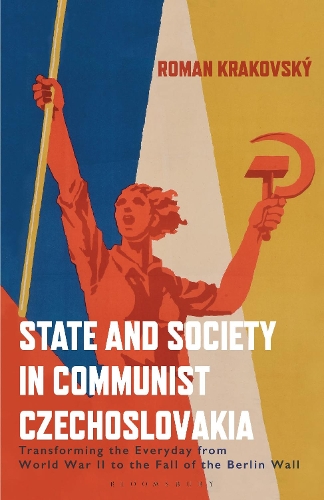
State and Society in Communist Czechoslovakia: Transforming the Everyday from WWII to the Fall of the Berlin Wall
(Paperback)
Publishing Details
State and Society in Communist Czechoslovakia: Transforming the Everyday from WWII to the Fall of the Berlin Wall
By (Author) Roman Krakovsky
Bloomsbury Publishing PLC
Bloomsbury Publishing PLC
20th February 2020
United Kingdom
Classifications
Tertiary Education
Non Fiction
Social and cultural history
European history
Sociology
Cultural studies: customs and traditions
Political science and theory
Central / national / federal government
Political leaders and leadership
Social theory
Regional, state and other local government
943.704
Physical Properties
Paperback
352
Width 135mm, Height 216mm
399g
Description
Across central and eastern Europe after World War II, the newly established communist regimes promised a drastic social revolution that would transform the world at great pace and pave the way to a socialist future. Although many aspects of this utopian project are well known - such as fast-paced industrialisation, collectivisation and urbanisation - the regimes even sought to transform the ways in which their citizens interacted with each other and the world around them. Using a unique analytical model based on an amalgam of anthropology, sociology, history and extensive archival research, award-winning scholar Roman Krakovsky here considers the Czechoslovakian attempt to 'reinvent the world' - 'time' and 'space' included - in this all-encompassing way. Ranging from WWII to the fall of the Berlin Wall, his innovative analysis variously considers the impact of Stakhanovism, the impossible-to-achieve production targets intended to assert socialism's future potential; the attempt to replace Sunday's Christian attributes with socialist ones; and the profound changes brought about to the public and private spheres, including the culture of informing and the ways this was circumvented. Across a wide range of case studies Krakovsky demonstrates both the far-reaching extent of the communist vision and the inherent flaws and contradictions that gradually destabilised it. This in-depth perspective is vital reading for all scholars of twentieth century history and politics.
Reviews
Krakovsk offers with this volume a remarkable perspective on the fundamental changes to the social order in socialist Czechoslovakia .... Krakovsk is eloquent in his combining of micro studies with general questions about socialist society. It is a stimulating, unconventional book. * Canadian Slavonic Papers *
This monograph has many strengths and will assist the reader to fully understand how the Communist Party attempted to permeate all aspects of society. The chapters are based on clear and focused case studies ... An excellent contribution to the post-1989 historiography on communism. It offers a refreshing approach to understanding both ideology and society through a novel focus on time and space. * Europe-Asia Studies *
Author Bio
Roman Krakovsky is a lecturer at the University of Geneva. He received his PhD in 2012 from the Universite Paris-Sorbonne and won a number of awards for his doctoral thesis, among them the Prix d'histoire sociale and the Fraenkel Prize in Contemporary History.
